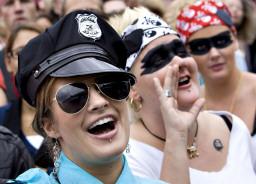Italy's gay police and military are coming out to fight prejudice in the forces so that more of them don't have to keep their sexual preferences a secret.
Gay and lesbian officers have set up a new association, Polis Aperta (Open Polis), which will have its founding meeting in Bologna later this month.
''We're coming out against creeping discrimination,'' said Nicola Cicchitti, president of the new group.
The September 26 meeting in Bologna, a traditional bulwark of liberal sentiment, will draft the organisation's statute and draw up a series of initiatives including a 'collective coming out' which organisers hope will be as big as possible, Cicchitti said.
He said the decision to rally openly to the cause had been encouraged by other European groups, particularly Gaylespol of Spain, which hosted this year's annual get-together of 14 uniformed gay associations in Barcelona.
So far Polis Aperta has 200 members, fairly evenly spread among the state police, the finance guards (tax police), traffic cops, Carabinieri paramilitary corps and the armed forces proper.
They are bidding for official recognition from the defence ministry.
Their main aims are to combat a 'macho' culture, end the present Don't Ask, Don't Tell line, and be assigned to cases of crimes against gays, as happens in other countries.
Polis Aperta says many gays have been deterred from coming out after seeing reprisals of various kinds against colleagues who did, ranging from ostracism to 'punitive' transfers.
The unveiling of the new group in Italy's biggest selling newspaper Corriere Della Sera was hailed by Italy's gay community.
''The birth of Polis Aperta marks an important new landmark in the creation of of an ever more visible lesbian, gay, bisexual and transgender (LGBT) community,'' said Arcigay, Italy's main LGBT organization, adding it had put its full weight behind Polis Aperta's foundation.
''The presence of visible gays and lesbians in the armed forces and police will help these institutions to address the homosexual issue in a new and positive way and lead to a significant improvement in the everyday lives of of gay service people,'' it said.
The Mario Mieli Association, another gay rights group, said: ''This is a novelty...that will move Italy closer to the rest of Europe and break with the absurd macho taboos which still pervade the armed forces''.
''The Mario Mieli Association sends its best wishes to Polis Aperta and all the LGBT's in uniform, who will gain from this experience fresh visibility, courage and strength to improve their own lives and those of us all''.
Centre-right gay association GayLib expressed its solidarity with Polis Aperta.
''The military life often forces gays to lead a double life,'' GayLib said.
It said Polis Aperta's foundation would be a milestone for the Italian gay movement and ''a further resource for demonstrating the absolute normality of homoerotic orientations''.
Most police forces around the world have never had policies excluding sexual minority members.
For the military, most Western countries have removed such policies.
Of the 26 countries that participate militarily in NATO, more than 20 permit open lesbians, gays, or bisexuals to serve; of the permanent members of the United Nations Security Council, two (United Kingdom and France) do so.
The other three generally do not.
China bans gays and lesbians outright while Russia excludes all gays and lesbians during peacetime but allows some gay men to serve in wartime.
The United States prohibits homosexuals from military service by law, but does not inquire as to prospective servicemembers' possible homosexuality under its Don't Ask, Don't Tell policy.
Israel is the only country in the Middle East that openly allows gays and lesbians to serve in the military.









